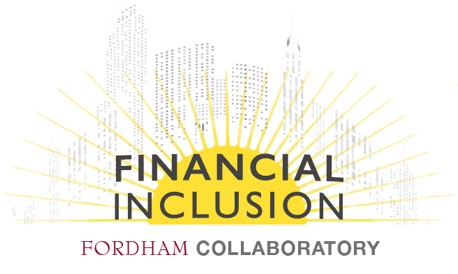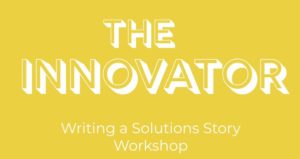Posted June 19, 2019 by Carey Weiss, Director of Sustainability Initiatives for Fordham University.
There were ten social innovation applied learning and action research groups hosted by the Collaboratory this year serving approximately 131 students who were engaged in learning about sustainability challenges and social innovation solution frameworks, as follows:
- Financial Inclusion
- Sustainable Fashion
- Resettled Students
- Climate impact initiatives
- Solutions Journalism
- Impact Investing
- Diversity, Equity and Inclusion
- Social Impact Storytelling
- Systems Thinking methodologies
- Design for Social Impact
Each is described below with outcomes and future plans noted.
The Financial Inclusion Practicum used systems thinking and applied research to examine issues and opportunities of the unbanked and underbanked in the Bronx. Preliminary research, including a literature review, was conducted for the corporate partner- Spring Bank- pointing them towards three key levers, namely: trust, income, and financial literacy/health as opportunities to be addressed through targeted community partnerships. This practicum was created as a two-year effort, ending (or renewing) in 2020. Financial Inclusion fellow Max Lynch, GSB ‘19, was founder and leader of the effort and has landed a position with Spring Bank to continue the work over the summer and to plan out the second year’s effort.
This practica team consisted of: 17 undergraduate and two graduate students, three alumni, two faculty, and Spring Bank. Students came together from GSB in different areas including finance and business administration, as well as from FCRH in international political economy, economics, and political science, among others. The Young Fordham Alum raised a small amount of funds to add to existing Collaboratory resources specifically for this project. Grant inquiries were created over the course of the year for JPMorgan Chase, Metlife, and BNY Mellon.
The Sustainable Fashion team has been meeting for two years, first to orient students around sustainability challenges of the fashion industry. First steps included engagement of industry leaders through speaking opportunities at Fordham, which lead to internships obtained by students in the field. Opportunities for travel abroad for sustainable fashion related academic experiences at other institutions added to the students’ knowledge base. In this second year, from Fall 2018-Spring 2019, students offered faculty and administrators a volume of curricular materials culled from other institutions for design of future FCLC Fashion Minor/Major and GSAS/ FLS Grad degree programs. There were two major outcomes in Spring of 2019:
- Design of a proposal for a new undergraduate Sustainable Fashion Minor to phase out the existing Fashion Minor (which has been experiencing retention issues.) The student proposal was reviewed and updated by faculty and four Deans’ signed onto it as a new strategic initiative headed by Fordham College Lincoln Center (FCLC. It received very high marks from the reviewers, but still requires funding for a director. An Advisory Board is now being considered to include industry executives and alumni.
- The student team also delivered in April 2019 a two-day immersion course that introduced Fordham participants (including alumni and fashion executives/alumni) to the basic sustainability issues and opportunities faced by the Fashion industry. The first day of the course was organized around site visits to fashion companies and incubators in Brooklyn, where industry experts explained and showed their manufacturing and design processes. The second day provided lecture-style presentations from high level industry speakers. Through this immersion experience Fordham was able to establish its intentions to be a leader in the space of undergraduate education and also business/advocacy teaching in sustainable fashion- something that is a gap currently among NYC higher education institutions (and nationally as well).
Resettled Students Practicum- this group of nine students from all three undergraduate schools mapped forces that are disrupting integration of student immigrants, including asylum seekers, who are enrolled at Fordham. They looked for solutions to improve the academic experience and retention of this population, generated new ideas to support the Faith & Hope scholarship campaign. Their final deliverable was a presentation to Development and University Relations (DAUR) that included asylum student story videos created with the help of several teams: the Collaboratory Our Story team mentors, the Collaboratory Design for Social Impact Production team’s videographer, and Fordham actors from the FCLC Theatre Department. One of the Social Innovation Faculty Fellows, Professor Marciana Popescu from GSS, designed a research proposal around this team and has been working closely with them.
The Climate Impact Initiative numbered about 20 students and focused on mapping Fordham resources in sustainability through interviews and research about Fordham sustainability assets. While they did not meet their deliverable of a finalizing a visual map, the effort will continue in the Fall. This group was comprised of environmental studies and STEM field students in FCRH with some GSB students, and continued to grow throughout the year to be the largest goup in the Collaboratory. Future plans include two new opportunities:
- A new “circular economy” waste management company called Eco-Hub has requested a team of students to study recycled waste stream purchase vendors. We will be working with them over the summer to outline the exact challenge questions.
- A Fordham faculty who teaches Environmental Economics and conducts research on the potential for utility congestion pricing to affect climate change, has inquired about using this practicum team to conduct air quality monitoring in NYC next year.
Solutions Journalism – In April 2019, The Innovator publication came out in its first edition with a forward by prominent NY Times journalist David Bornstein. Its release was met with wide acclaim at the University, and was the first joint project between the Collaboratory and the FCRH Communications & Media area. Through a flourishing partnership with SolutionsU (founded by Bornstein) the Collaboratory was able to place Professor Garrett Broad on the organization’s Faculty Advisory Board. The Stanford Social Innovation Review journal also provided mentoring and support, as did professional journalist John Schoonejonegen, who coached and edited drafts in a consultant capacity.
Impact Investing- this relatively new education focus at Fordham reaches students in GSB Finance, GSB Accounting, GSB Bus. Admin, FCRH IPE, FCRH Economics, GSAS IPED, among others. It was supported by the Collaboratory in several different ways this year:
- As the third year of a three-credit course offered by Professor Sris Chatterjee, Impact Investing was also co-lead by the Collaboratory Director. This year, in addition to a diverse group of guest lecturers from industry, the Collaboratory arranged for Acumen to offer four research challenge questions assigned to teams within the class. Each research question was intended to support decision making on future strategic objectives of the Acumen organization. One team (of graduate IPED students) remained on the research after the course was over and produced a white paper for Acumen that is now under review for publication.
- A second Impact Investing course, new this year, was created by MBA ’86 alum Peter Lupoff and was tied to the Wharton Impact Investing challenge. One of the class teams won second place, on the heels of University of Vermont, and leading in front of Columbia and Yale!
- Several Impact Investing related conferences and events were held this past year, organized by Peter Lupoff and supported in part by funds from the Collaboratory, by the GSB Dean, and Finance Area Chair in partnership. The events were extremely well attended by both grad/undergrad students and faculty.
- Seven students and one Collaboratory staff attended the SoCap 18 annual convening of experts and investors looking to create impact on social/environmental issues through capital sources. This group included two MBA’s, one M.S. student, four undergraduate students and a Collaboratory staff member.
Diversity, Equity and Inclusion– this team of eight students focused on food insecurity of commuter students who generally do not have university meal plans. They partnered with a non-profit called Swipe Out Hunger and received “coaching” on how to create dialogue with Aramark, the university’s catering service to allow students with excess meal swipes to donate them to those in need of meals. The effort was joined by a large number of faculty who are deeply concerned about students whose food insecurity affects their academic work and attention in classes. We continue to pave the way towards solutions through a myriad of contract and other challenges with the caterer. Other avenues will be explored over the summer and into next year.
This team split into three groups this year to handle the volume of interest and requests
Our Story Event– this group was led by Honors student Rosie McCormick FCRH ’20, to create two town hall events with a total of 10 storytellers, and 350 in audience. At the end of the Spring semester a new pilot event- an open microphone night – was packed with full attendance. This team size grew to almost 15 student storyteller mentors (up from five last year).
Storytelling Curriculum– Storytelling fellow Julia Gagliardi, FCRH ’19, focused on drawing together and supporting faculty from different academic areas and campuses to discuss and share curriculum. As an outcome of that effort, Professor Sarah Gambito, FCRH English, was funded to meet other Ashoka U Faculty at fellow Changemaker Campus Glasgow Caledonia in Scotland to discuss storytelling curriculum across the Changemaker Campus network. A second outcome planned for next fall, is a half day program that will be offered by the Collaboratory using a non-profit called Narrative Strategies 4 (N4) to train faculty in storytelling practices that may be used in classrooms. This event has already been advertised and interest from faculty is high.
Storytelling Consulting– Practicum fellow Emmanuella Chioke, FCRH ‘19, organized a consulting arm of the Storytelling for Social Impact practicum to allow for deployment of storytelling mentors requested by faculty and administrators for events and classroom experiences. This group facilitated the Resettled student scripts for asylum students, later filmed by the Design for Social Impact production team using Fordham actors. They also supported a GSB freshmen class, and taught storytelling at a Women and Girls Impact conference.
Systems Thinking Practicum- Collaboratory student fellow Raymond (Zexin) Wu added two other students this year to his efforts to bring systems thinking to all the practica teams. They visited with the Financial Inclusion, Climate Impact, and Resettled Students practica for a series of sessions to teach the teams how to trace loops of factors that influence those challenges. A key highlight of the year was the opportunity afforded by Assistant Dean Robert Daly, GSB / LC, to work with 18 freshmen in the First Year Formation course for five sessions. Juuling was the challenge topic brought in front of those students and engagement was very high as they learned the systems thinking process to identify viable solutions to end Vaping. The plan for next year is to build out a “corps” of systems thinking ambassadors to bring this work to faculty and elsewhere. The MBA program has offered a four-hour time slot for that group’s orientation in August and the Collaboratory Director and Assistant Director are designing systems thinking excercises with the Raymond and his team.
Design for Social Impact- this new practicum was created to engage students with visual, graphic design, art, marketing and communications skills in projects that would serve the university community with a cohesive presentation about social innovation at Fordham. With response from over 50 students in attendance at the initial information session, and then more applicants as time went on, it became clear the idea for applied learning and research around Design for Social Impact has solid traction. The practicum was organized with four paid student fellows- one overseeing all subgroups, and the other three in charge of individual groups as delineated below. Next year, this effort will require more faculty, administration and/or consultant support as the moving parts are numerous. Two computer stations were purchased and installed in the RH Lab and equipped with Wacom freehand drawing tablets as well as Creative Cloud Software.
- Branding– this team worked on a Collaboratory style guide, website (not yet complete) logos for individual practica, and other branding requests. For example, FCLC requested assistance in branding of a newsletter related to social purpose opportunities being offered to their students. Currently a faculty from GRE has requested branding support for an initiative to build a school in Kenya for Girls.
- Media– this team handled all media channels and reviewed/updated and created content. This included facebook, Instagram accounts (several of the practica requested to open their own individual instagrams) and twitter.
- Production– this team focused on photography and videography for Collaboratory and related events, teams, and activities. Initially, team members visited each practica meeting to photograph and create videos for stock file content to be used in future. They structured files, and created organization around the storage of multimedia data. They are currently working on short videos for website content.




